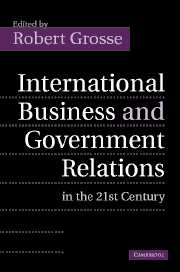Book contents
- Frontmatter
- Contents
- List of figures
- List of tables
- List of contributors
- Acknowledgments
- Introduction
- Part I History and theories of analysis of international business–government relations
- Part II The shifting international business–government partnership
- Part III Bargaining theory and the obsolescing bargain
- 10 From the obsolescing bargain to the political bargaining model
- 11 The bargaining view of government–business relations
- 12 Shifts of Chinese government policies on inbound foreign direct investment
- 13 Has the obsolescing bargain obsolesced? Negotiating with foreign investors
- Part IV Host and home government views of international business
- Conclusions
- References
- Select bibliography of J. N. Behrman's works
- Index
10 - From the obsolescing bargain to the political bargaining model
Published online by Cambridge University Press: 22 September 2009
- Frontmatter
- Contents
- List of figures
- List of tables
- List of contributors
- Acknowledgments
- Introduction
- Part I History and theories of analysis of international business–government relations
- Part II The shifting international business–government partnership
- Part III Bargaining theory and the obsolescing bargain
- 10 From the obsolescing bargain to the political bargaining model
- 11 The bargaining view of government–business relations
- 12 Shifts of Chinese government policies on inbound foreign direct investment
- 13 Has the obsolescing bargain obsolesced? Negotiating with foreign investors
- Part IV Host and home government views of international business
- Conclusions
- References
- Select bibliography of J. N. Behrman's works
- Index
Summary
Introduction
The best-known model of relations between multinational enterprises and host country governments is the obsolescing bargain model (OBM), first developed by Raymond Vernon in Sovereignty at Bay (1971). obsolescing barguin model (OBM) explains the changing nature of bargaining relations between a MNE and host country (HC) government as a function of goals, resources, and constraints on both parties (Vernon, 1971, 1977; Kobrin, 1987; Brewer, 1992; Grosse and Behrman, 1992; Grosse, 1996). In OBM, the initial bargain favors the MNE, but relative bargaining power shifts to the host country government over time as MNE assets are transformed into hostages. Once bargaining power shifts from the MNE to the host country, the government imposes more conditions on the MNE, ranging from higher taxes to complete expropriation of MNE assets. Thus, the original bargain obsolesces, giving OBM its name. Originally applied as an explanation for widespread expropriation and nationalization in the 1970s of MNE natural-resource subsidiaries located in developing countries (Vernon, 1977), OBM was later tested in other situations such as manufacturing MNEs and developed HCs, with much weaker results (Kobrin, 1987).
The now widely held view among IB scholars is that OBM has outlived its usefulness. The many case studies testing the model suggest that MNEs were able to retain relative bargaining power and prevent opportunistic behavior by HC governments so the bargains, in practice, seldom obsolesced.
- Type
- Chapter
- Information
- Publisher: Cambridge University PressPrint publication year: 2005
- 45
- Cited by



